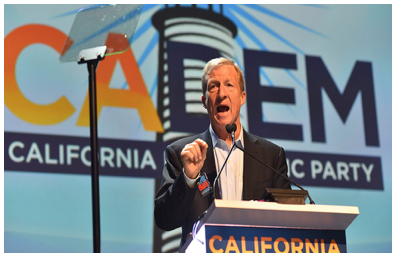CommentsCAL MATTERS--As California’s Democrats wrapped up their party’s annual convention Sunday, they left San Diego as they arrived: a party still fraying at the seams after the 2016 election, held together by one strong bond—a unifying dislike of President Donald Trump.(Photo above Billionaire activist Tom Steyer at Dems convention.)
Split between their traditional moderate-to-liberal faction and lefter-leaning progressives, the delegates refused to endorse in key races and snubbed a few of their own incumbents, notably longtime U.S. Sen. Dianne Feinstein. Their emotional differences over hot issues such as single-payer health care and rent control were on display. Yet through it all, dissing Trump was a reliable applause line.
“Let us find what unites us at this convention,” said Eric Garcetti, the mayor of Los Angeles who’s been discussed as a Democratic presidential prospect, on the opening evening. “Republicans and Internet trolls and Vladimir Putin (are) laughing every time we’re fighting with each other and not fighting against the Republicans.”
Billionaire progressive activist Tom Steyer used his keynote speech as an opportunity to reinforce his public campaign calling for impeachment. “Does anyone in this room believe that Donald Trump is fit to be president of the United States?” If anyone in the convention hall thought so, it was impossible to hear them over the jeering.
Congresswoman Maxine Waters of Los Angeles got some of the biggest cheers of the weekend by building on that theme. Her speech questioned the president’s loyalty and mental health, finishing with a rousing chant of “Impeach 45!”
For a party still smarting from a vicious 2016 presidential primary between Hillary Clinton and Bernie Sanders—one that had escalated into a contentious party leadership battle last year—it’s nice to find something that everyone can agree on.
“Obviously we have a variety of different views. That’s what parties are about,” said state Sen. Richard Pan of Sacramento. “We have differences about how we look at things, but we’ve got to protect our country.”
Still, those differences could be important come June. In a number of toss-up congressional races, a surplus of left-of-center candidates threaten to split the primary vote, allowing two Republicans to progress to the November ballot. Shutting Democrats out of contention in those races could jeopardize party plans to re-take control of the U.S. House.
Though the party had hoped to winnow some of the field this weekend by making endorsements in some of those seats, in the races to replace Southern California GOP Reps. Steve Knight, Darrell Issa, and Ed Royce, no such luck. Under party bylaws, the delegates were too divided to make an official choice.
Failing at those official channels, party chair Eric Bauman resorted to old fashioned guilt from the convention hall stage on Sunday in an attempt to thin the herd.
“We have an overpopulation problem,” he said. And then to some of those surplus candidates: “Isn’t there some other way to express your public service….The voters in those districts want to elect a Democrat (and) they’re tired of the right-wing hateful agenda of Donald Trump.”
Indeed, both party organizers and aspiring Democrats candidates aim to bring national news scandals to the local level.
“In 2016, Russians and Republicans were very good at sewing discord within our party, so I think we learned a lesson from that election,” said Andrew Janz, who is running to replace GOP Rep. Devin Nunes in his San Joaquin Valley district.
The lesson: stick together and focus on the common political enemy.
Outside the room where Janz’s endorsement by the party was to be voted on, one delegate, social activist Emily Cameron, complained about the candidate’s single-minded focus on his opponent. “If you look at his Twitter, it’s like every tweet is about Devin Nunes,” she said, arguing that the candidate should focus more on the economic interests of the Central Valley and less on the Russia investigation and the ties between Nunes and Trump. “It’s not what people care about!”
But evidently, enough delegates did. Janz won the endorsement.
 In a state where only a quarter of adults approve of the president’s job performance, emphasizing Trump above all else isn’t a bad strategy. Katharine Marrs, the party’s state field director for 2018, said opposition to Trump has been a “gateway” cause for bringing political neophytes into the world of left-of-center party politics.
In a state where only a quarter of adults approve of the president’s job performance, emphasizing Trump above all else isn’t a bad strategy. Katharine Marrs, the party’s state field director for 2018, said opposition to Trump has been a “gateway” cause for bringing political neophytes into the world of left-of-center party politics.
Union supporters of both Antonio Villaraigosa and Gavin Newsom rally outside the San Diego Convention Center.
“Sometimes we ask people what their top issue is at the door and instead of giving us healthcare or the economy, sometimes their top issue is Trump,” she said. But can party unity built around opposition to a single candidate last past a single election?
“What we’ve seen is that it’s sustainable for now,” said Marrs. Finding areas of common agreement is a “slower process.”
And for now, the party base appears to be tacking left.
When the nearly 3,000 delegates voted to endorse the statewide races, Lt. Gov. Gavin Newsom won the top vote share in the gubernatorial contest. Together with the former state superintendent of public instruction Delaine Eastin, both of whom support a state-funded single payer health insurance program, the progressive bloc captured 59 percent of the delegate vote.
Former Los Angeles Mayor Antonio Villaraigosa, who is skeptical of the state’s ability to implement or fund a single payer system and who has taken positions opposed by many organized labor groups, came in at 9 percent. That followed a tough weekend for the former mayor of Los Angeles, who was repeatedly heckled by party activists.
In the U.S. Senate race, state Senate leader Kevin de León received a majority of delegate vote over Feinstein, whom many delegates considered too hawkish on foreign policy and too dovish on President Trump.
That de León didn’t clear the 60 percent threshold means that the party didn’t officially offer an endorsement—but the body as a whole clearly had a preference. Between de León and progressive dark horse candidate Pat Harris, just over 59 percent of the delegates cast their votes to the left.
 “Resistance doesn’t just mean saying no. You have to move on a parallel track with a positive proactive agenda,” said de León, suggesting progressive policies like a higher minimum wage and stronger environmental protections were needed. But he also warned against trying to “cajole” or “negotiate” with President Trump, whom he compared to the scorpion in the fable of the scorpion and the frog—a malevolent force unable to control its own destructive impulses.
“Resistance doesn’t just mean saying no. You have to move on a parallel track with a positive proactive agenda,” said de León, suggesting progressive policies like a higher minimum wage and stronger environmental protections were needed. But he also warned against trying to “cajole” or “negotiate” with President Trump, whom he compared to the scorpion in the fable of the scorpion and the frog—a malevolent force unable to control its own destructive impulses.
U.S. Sen. candidate Kevin de León addresses the California Democratic Party convention, winning a much larger share of delegate support than veteran Sen. Dianne Feinstein.
Rather than write him off, last year Feinstein expressed hope that Trump could learn to become “a good president,” to the chagrin of many on the California left. According to the website FiveThirtyEight, she has voted in line with the president’s preferred legislation 28 percent of the time, placing her roughly in the middle of all Democratic and independent senators. California’s junior senator, Kamala Harris, who also spoke at the convention and has been mentioned as a presidential contender, voted with the president just 15 percent of the time.
De León was careful to specify that he was not comparing his opponent in the senate race to a frog. But he did say that his unrelenting opposition to the administration made for a meaningful difference between the two of them.
President Trump “holds the most powerful position in the world and therefore he’s in a position to go out of his way to hurt California,” he said. “So why not be proactive, be preemptive, and position yourself—as opposed to be reactive? Because the onslaught is going to happen.”
In the end, of course, delegates to the convention may or may not accurately represent all Democratic voters statewide—not to mention independents inclined to vote Democratic. Feinstein knows that well, having been booed at her own party’s convention for declaring her support of the death penalty when she was running for governor in 1990. All the while, her campaign was gleefully filming the moment—turning it into a campaign ad to underscore her independence.
(Ben Christopher is election reporter for CalMatters [[calmatters.org]] … where this piece originated.)
-cw
Tags:
















